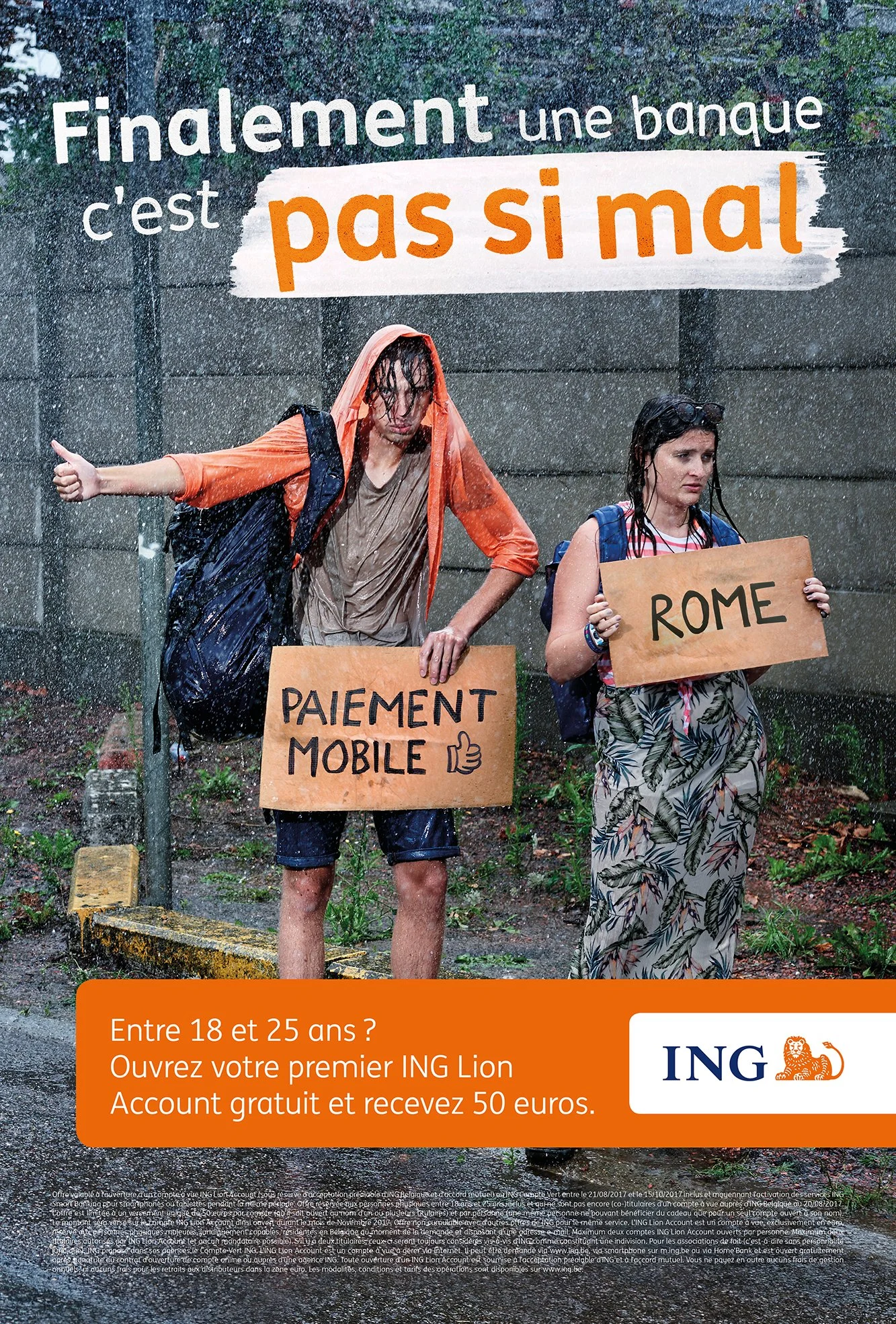Banking done differently.
Working on ING Belgium at Mortierbrigade was an exciting opportunity to redefine how financial advertising connects with its audience. Together, we created a daring new universe for the brand—one that broke free from the cluttered, formulaic approach typical of the financial sector. The idea was simple yet revolutionary: ING clients are smart enough to make their own decisions, and ING’s role is to provide the tools and services to help them organize their lives and businesses.
Here’s a closer look at some of the campaigns that stood out during this time:
“The Best Things in Life Are Free” (Christmas 2017)
For the holiday season, we focused on the ING Lion Account, emphasizing its accessibility and cost-free nature. The campaign humorously explored the concept that the best things in life—like the Lion Account—are free.
The TV spot depicted a man hilariously missing out on wonderful moments, like catching a bouquet or winning a prize, underlining how easy it is to miss opportunities. This clever concept combined humor with self-awareness, presenting ING as simple, honest, and humble.
The integrated campaign ran on TV, radio, print, and online, reinforcing ING’s image as a bank that stands out with its human touch.
“Very Private Banking” (September 2017)
Private Banking isn’t typically what comes to mind for a brand like ING, known for democratizing banking with free accounts and apps. But this campaign proved how personal and tailored ING’s Private Banking services could be.
We invited clients like entrepreneur Wim Voss to share their experiences with ING Private Banking. By branding the service as “Voss Banking” in the campaign, we highlighted the deep and personal relationships ING Private Bankers build with their clients.
“The Lost Banking Generation” (August 2017)
Younger audiences (18–25 years old) don’t naturally gravitate toward banks. They’re busy with other priorities, and banking often seems irrelevant to them. To change that perception, we created a campaign showing how a current account could simplify their lives.
The ad followed a young man stuck relying on his mom for money because he lacked his own account, leading to a series of hilariously awkward moments. The tagline, “Banking isn’t such a crazy idea,” resonated with young people, positioning ING as a bank that understands and supports their needs.
The campaign spanned cinemas, radio, billboards, online, and social media, establishing a connection with this elusive audience.
“Better Safe Than Sorry” (June 2017)
Insurance might seem like a necessary evil, but this campaign made the case for why it’s essential. By confronting Belgians with real-life mishaps, we reminded them that ING offers the right insurance solutions for life’s unpredictable moments.
“We All Got Skills” (April 2017)
Investing can feel daunting for most Belgians. They often think it requires a large budget, deep expertise, or that it’s only for older generations. We debunked these myths with humor and simplicity.
The campaign showed people performing quirky “hidden talents,” from a grandmother scaring her grandkids with her dentures to a dad beatboxing his baby to sleep. The message? If we all have hidden skills, we can also master investing—with ING making it as accessible as starting with just €25 a month.
This campaign ran across TV, radio, print, and digital, directing viewers to ing.be/eenvoudig-beleggen for personalized investment simulations.
Rising Above the Financial Advertising Norm
These campaigns weren’t just about advertising products; they were about reshaping how ING was perceived. Mortierbrigade helped ING Belgium stand out with bold, creative campaigns that embraced humor, relatability, and a human-centered approach. By stepping away from the traditional “serious” tone of financial advertising, ING positioned itself as a modern, approachable, and empowering partner for its clients.
Looking back, these campaigns remain a testament to the power of creativity in redefining industry norms—and how a daring vision can resonate with audiences across all demographics.




















